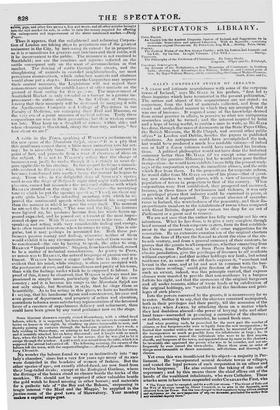GALE'S CORPORATE SYSTEM OF IRELAND.
" A CLOSE and intimate acquaintance with some of the corporate towns of Ireland," says Mr. GALE in his preface, " first led to
those inquiries which have terminated in the present publication." The nature and object of this acquaintance :are not stated: we conjecture, from the kind of materials collected, and from the exact and methodical manner in which they are arranged, that it was one of business. It required some of the knowledge derived from actual practice in aflitirs, to perceive to what use antiquarian researches might be turned ; and the interest inspired by habit and a hope of being useful, to enablv a man to wade, as Mr. GALE has done, through the mass of documents in the State Paper Office, the British Museum, the Rolls Chapel, and several other public offices* in London and Dublin, besides the papers in published collections. An antiquarian could have accomplished the task, but would have produced a much less readable volume—if indeed one or half a dozen volumes would have contained his lucubra-
tions. A political philosopher would not have done the historical summary better than Mr. Gsss: (if we except some occasional flashes of the genuine Milesian) ; but he would have gone further in exposition—he would have exhibited more fully- the present work- ings of the corporation system, its itnmediate abuses, and the evils which flow from them. In the propositions for corporate reform, be would differ from Mr. GALE on one of his plans—that of grant- ing new charters to small places, with a view of increasing the population of towns in proportion to that of the country. When corporations were first established, they prospered and increased, because, in those tunes of lawlessness and violence, it was only in privileged places that industry could be exercised in peace, or retain what it had acquired. The present absence of manufac- tures in Ireland, the wretchedness of the peasantry, and their dis- proportionate numbers to the inhabitants of towns when compared with Great Britain, depend upon causes too deep for an act of Parliament or a great seal to remove.
IVe are not sure that the author has fully wrought out his own intentions. What he has done, is to give a very complete though brief account of the Irish corporate system, from its first establish- ment to the present time, and to offer some suggestions for its renovation. By an extensive examinalon of the original charters from the time of HENRY the Second to about the close of the six- teenth century, and from a general summary of their contents, he proves that the grants to all corporations, whether emanating from the Crown, from Prelates, or front Peers having rights of ex- el us i ve jurisdiction, give the privileges of freemen to all residents without exception ; and that neither holdings nor lands, but actual residence (or, as some of the old deeds express it, " couchant and levant in the same, and at lot and scot in common with the bur- gesses there residing," could give freedom of the borough. To such an extent, indeed, was this principle carried, that express clauses were inserted to provide that non-residence by a burgess forfeits his right, and that the successors of the original burgesses and all under-tenants, either of waste lands or by subdivision of the original holdings, are "entitled to all the freedoms and privi- leges of such places."
Into the powers conveyed by the grants, it is unnecessary for us to enter. Suffice it to say, that the charters remained unimpaired, both in their privileges and their purity, till the accession of the STUARTS; when JAMES, by attacking them on a matter which they had doubtless abused—the power of levying tolls and other local taxes—succeeded in prccuring a surrender of the charters; or rather, assuming their surrender, he issued fresh ones.
And when granting such, he prescribed for the most part the number of citizens, or free burgesses,who were to legally form the new incorporation ; he limited that number within the narrowest bounds ; he separated all classes of the incorporation as much as possible f the inhabitants at large ; he, in almost each instance, named the individuals who were to be first mayors, sheriffs, and burgesses of the town, and appointed them by name in the charters; he invariably also appointed the person who was to be recorder, and not nn- frequently he even named the town-clerks. Hence there arose an order of things most favourable to direct nomination, self-election, and thorough ex- clusion.
Yet even this was insufficient for his object—a majority in Par- liament. He "incorporated several desolate towns or villages, and vested the legal powers of each corporation in an officer and twelve burgesses." He also enforced the taking of the oath of supremacy ; and by this means threw the chief offices out of the hands of the wealthiest inhabitants, who were Catholics. These attacks seem to have been suspended under CHARLES the First, who
• The Tower moat be excepted. and for • sufficient reason. 'Thu Grant of Tolls and the Writ of Election iestord by Oliver Cromwell, to be seen in the Appendix, were obtained from lie Tower. But the fees charged in that repository being sixteen shillings and eighipence for the ware inspection of any one document, precluded the author from any extended inquiry there."


















 Previous page
Previous page